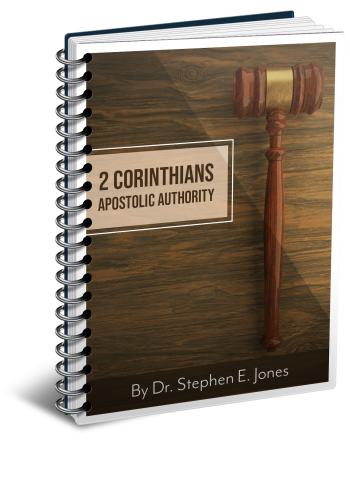Latest Posts
View the latest posts in an easy-to-read list format, with filtering options.

An in-depth commentary/study on the second book of Corinthians
Category - Bible Commentaries

In 2 Cor. 13:3 Paul was speaking to his opponents who sought proof that Christ was indeed speaking through Paul. He then says in 2 Cor. 13:4,
4 For indeed He was crucified because of weakness, yet He lives because of the power of God. For we also are weak in Him, yet we shall live with Him because of the power of God directed toward you.
Here Paul continues his discussion of weakness, which he had emphasized in the previous chapter, especially in 2 Cor. 12:9, where God had told him, “My grace is sufficient for you, for My power is perfected in weakness.”
Weakness, as seen by the world, is paradoxically our greatest strength. As long as we live according to our own strength, we believe we have no need of God’s power. But when we feel weak, we tell our flesh to stand aside and depend upon God to manifest His power and strength.
Jesus Himself was crucified in “weakness” insofar as the flesh was concerned. But weakness, in the sight of God, is an opportunity for God’s “grace” to manifest. Grace is the foundation of the New Covenant, for it is based on the promises of God and His ability (power) to make good on those promises. Weakness in that case is one’s refusal to have confidence in the flesh and the will of man, as seen in the Old Covenant vows of men.
As long as we think we have the power and strength to accomplish something, God allows us to try, for this is the exercise of our lawful authority given to mankind in Gen. 1:26. It is only when we abandon our own strength, our own will, our own fleshly power that grace begins.
Grace does not supplement the flesh, nor is it given to help the flesh fulfill its Old Covenant vows. Grace works alone and then only when men humbly confess that their flesh is weak and unable to fulfill the will of God. It cannot even fulfill the good fleshly intentions of men’s Old Covenant vows.
Paul recognized the weakness of his flesh, but that was the secret of his strength. Those who sought proof of Paul’s authority as an apostle (and judge) ought not to focus upon Paul’s fleshly strengths—nor indeed upon any apostle’s fleshly strengths including genealogical credentials and education. Paul might have relied upon such things, if he had wished to do so, and as others apparently did. But Paul called those things “foolishness” and “dung.”
Paul preferred to be weak, for then he could provide no “proof” in himself as his opponents demanded. He relied fully upon the power of God operating in him and among the saints in the Corinthian church.
Paul continues in 2 Corinthians 13:5, 6,
5 Test yourselves [individually and as a church body] to see if you are in the faith; examine yourselves! Or do you not recognize this about yourselves, that Jesus Christ is in you—unless indeed you fail the test. 6 But I trust that you will realize that we ourselves do not fail the test.
If Paul had been a false apostle, as his opponents claimed, and if Paul’s gospel had been distorted or untrue, then his ministry in the Corinthian church would show evidence of being unfruitful. In other words, the church’s faith, based on Paul’s gospel, would not have been based on truth but upon untruth. So Paul tells them to examine themselves. Was Christ truly operating in their midst?
Go back to the beginning. Did they indeed receive the baptism of the Holy Spirit? Did they see the gifts of the Spirit operating in their midst? Did they see the evidence of signs and wonders in their midst? Surely they did, for Paul even found it necessary to correct some of the excesses when it came to the operation of spiritual gifts.
Paul was confident that if they examined themselves and saw how the Spirit of God was functioning in their midst, they would have to conclude that they did not “fail the test.” The church could only conclude, then, that Paul had indeed established a genuine church in Corinth and that they themselves, being fruitful, were the proof of Paul’s calling as an apostle.
2 Corinthians 13:7, 8 says,
7 Now we pray to God that you do no wrong; not that we ourselves may appear approved, but that you may do what is right, even though we should appear unapproved. 8 For we can do nothing against the truth, but only for the truth.
Paul’s prayer was that the church “do no wrong.” In other words, he prays that the church would not come to any wrong conclusions in regard to the questions raised in these letters. Paul quickly added that his concern was “not that we ourselves [i.e., Paul and his team] may appear approved.” The important thing was not to win his case or to have a high approval rating, but that the church would “do what is right.”
Knowing the truth was the important thing. Paul was obviously concerned that the “false apostles” would displace the grace and overthrow the truth in the church by elevating fleshly strengths and credentials. Paul continues in 2 Cor. 13:9, 10,
9 For we rejoice when we ourselves are weak but you are strong; this we also pray for, that you be made complete. 10 For this reason I am writing these things while absent, in order that when present I may not use severity, in accordance with the authority which the Lord gave me, for building up and not for tearing down.
Paul sought to strengthen the church and to edify it with the truth. He did not seek to make them strong in flesh but in spirit. He was concerned lest some part of the church would be built upon lies, which would require him to tear it down. Paul much preferred to build up in a positive way. He hoped that his letter would help the church build upon truth.
2 Corinthians 13:11 says,
11 Finally, brethren, rejoice, be made complete, be comforted, be like-minded, live in peace; and the God of love and peace shall be with you.
This is Paul’s final summary. Having scolded them in his letter, he wanted them to rejoice. Having made the necessary corrections in the building process, he wanted them to finish the structure with a greater understanding of truth. Having dealt with controversy that threatened to divide the congregation, he wanted them to be comforted by the Comforter and to restore the church to a place of love, unity, and peace.
Paul concludes his letter with a benediction in 2 Cor. 13:12-14,
12 Greet one another with a holy kiss. 13 All the saints greet you. 14 The grace of the Lord Jesus Christ, and the love of God, and the fellowship [koinonia, “communion, joint fellowship”] of the Holy Spirit be with you all.
Paul’s letters to the Corinthians give us instruction in resolving controversies among believers. As believers grow to spiritual maturity, they still have fleshly tendencies that are bound to cause conflicts within the church. For this reason Paul discussed the difference between the fleshly soul (or “natural man”) and the Holy-Spirit filled “spiritual man” in 1 Cor. 2:10-16.
He showed how the flesh was the cause of divisions in the church when many followed their favorite leaders. Paul insisted that we were all supposed to work for the same goal—edifying the church, which was the temple of God.
The church was also being hindered by a problem of immorality (1 Cor. 5:1). So Paul admonished the elders to set up a church court to deal with this problem. Apparently, the elders had no experience in this regard. They responded to Paul’s scolding and dealt with the problem, but it is obvious by Paul’s second letter that the sinner did not accept their verdict. Instead, he and perhaps others found fault with Paul.
The controversy allowed opponents of Paul’s teachings to drive a wedge in the church, dividing the people and causing some to question Paul’s credentials as an apostle. Hence, Paul spent a large portion of his second letter defending himself, his jurisdiction, and his gospel.
Yet in the midst of this, not only do we learn more about the church’s internal system of justice but Paul also finds time to teach about marriage relationships (1 Cor. 7) and love (1 Cor. 13). He writes about unity and fellowship, or communion (1 Cor. 10, 11), and he gives insights on how the house church conducted its meetings and its use of spiritual gifts (1 Cor. 12 and 14).
Paul’s climactic teaching on the resurrection of the dead in 1 Cor. 15 shows that this truth is one of the essentials of our faith.
In Paul’s second letter, he first shows how an Old Covenant mindset is a veil that blinds the eyes and hides the glory of God (2 Cor. 3, 4). Then he states plainly in the next chapter the truth that the Old Covenant hides. It is the truth that God has reconciled the world (2 Cor. 5:19) by the force of the New Covenant—God’s vow. We are ambassadors that carry this message to those still fighting God, because men do not believe that God is so benevolent. We are often persecuted for the sake of the good news (2 Cor. 6).
Paul then spends considerable time talking about money (2 Cor. 8, 9). The Greek churches had been inspired to send a sizable donation to the Jerusalem church, and Paul was entrusted with this mission. Paul understood that the value of this money extended far beyond the obvious physical need. It promoted unity between Jews and Greeks.
Because Paul’s gospel was viewed with suspicion among many Jewish believers, this love-gift seemed to take on greater importance as a unifier. Paul seemed to think that it could go far in tearing down the dividing wall in the minds of the Jewish believers in Jerusalem.
Lastly, Paul defends his apostolic calling and authority as an apostolic judge in the Corinthian church. Having urged them to set up a lower court to judge the matter of immorality in the church, he affirms their ruling when the guilty party refused to accept the elders’ verdict.
Yet having dealt with the problems, Paul concludes his second letter with a teaching about weakness and grace. Paul rejoices in his own fleshly weakness, because it shows his lack of dependence upon the Old Covenant. His confidence is in the power of God, not in the power of the flesh. The power of God through the New Covenant is a manifestation of grace.
Paul’s Corinthian letters are of great practical importance, because they focus upon church life as it existed in the first century. Paul’s other letters focus more upon teaching than upon church life. Hence, the Corinthian letters are quite unique, and studying them as we have done fills a void in a way that Paul’s other letters could not accomplish.
From that perspective, we are indebted to the actual problems and controversies within the Corinthian church, for without them we would be greatly impoverished in our understanding. Hence, this is a good example of how God uses evil to bring forth good and how God causes all things to work together for good (Rom. 8:28).